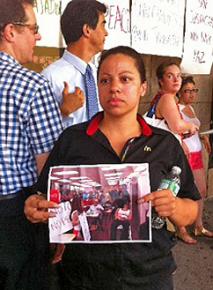No A/C, no peace!
tells what happened when workers at a Manhattan McDonald's challenged inhumane conditions on the hottest day of the summer so far.
THE SUFFOCATING heat wave that struck the Northeast U.S. for the past week brought new attention to the harsh conditions that thousands of low-wage workers endure every day of the year. While millions of New York City residents pondered how to escape from stifling temperatures, workers at a McDonald's in Manhattan's Washington Heights were being forced to work in a real-life "Hell's Kitchen."
July 19 was one of the hottest days of the year in New York, and workers at the McDonald's at 4527 Broadway raised their concerns--as they had many times before--about the extreme heat coming from the kitchen and the restaurant's lack of air conditioning or a proper ventilation system. The response from management was the same as in the past: Go back to work, stop complaining and deal with the situation.
By 10 a.m., however, it was clear that this Friday morning would not be another day as in the past. Instead, workers sent a strong message by walking off the job.
The first employee to step aside was Esheliz Méndez, who works as a cashier. Mendez said she felt sickened by the heat and went to the downstairs bathroom to vomit, according to her coworkers. But the supervisor followed Méndez downstairs, ordered her back to work and walked her back to the front of the restaurant. Méndez collapsed and had to be taken by ambulance to a local hospital.

By 11 a.m., a call for solidarity was put out on social media by organizers of Fast Food Forward, a group that has organized two days of strike actions by workers in New York City fast-food restaurants. The call attracted three dozen community activists and supporters, including the local City Council members Ydanis Rodriguez and City Council Robert Jackson, and state Sen. Adriano Espaillat. Unusually, the walkout caught the attention of the corporate media, too.
As the crowd of supporters grew bigger in size, it became clear how significant the bold action taken by these workers was. Displaying an inspiring confidence, the workers demand to meet with the restaurant's manager and listed a number of issues and demands that they saw as necessary to improve their working conditions.
Followed by the crowd, the manager of the restaurant fled through a side door, finding refuge in a branch of Apple Bank next door. Outside on the sidewalk, workers and supporters chanted, "No A/C, no peace" and "No A/C, no work."
By late afternoon, at least some of the restaurant's air conditioning units had been repaired, and three portable air conditioning units and fans had been brought in. Managers issued a statement apologizing for the "discomfort that workers experience."
Workers celebrated this victory, but decided to remain outside the restaurant, addressing the media and sharing with everybody their daily experience of working at McDonald.
Fearing retaliation for those who went on strike, workers and supporters made a call for a mobilization the next morning to support two of the workers who walked out, Luisa Villa and Alba Santana, who were scheduled to work an early morning shift the next day.
By 6:50 a.m. the next day, a smaller but still confident crowd, likewise including City Council members, was on hand to defend the strikers. Luisa and Alba went in to work, and restaurant managers were forced by the public pressure to assure supporters that nothing would happen to them.
WORKERS AT the Washington Heights McDonald's have had to deal with very high temperatures during New York City's summer for years. They say management has tended to turn off the air conditioning as a way of discouraging customers from staying longer at the restaurant, while this at the same time creates an unsafe situation for workers.
As Luisa Villa, who has worked at the McDonald's for nine years, told the crowd outside he restaurant:
Every year is the same. They always tell us that the A/C isn't working and ask us to work under this heat. They make fun of us--they think that we're animals, but we are people. We don't want to die, and you can certainly die from the heat.
But the threats to McDonald's workers don't just come from conditions inside the restaurant. People who work at the fast-food chain face a life of poverty--something that was underlined when McDonald's, working with credit card company Visa, came up with a website to educate employees about how to budget their income. The sample budget showed that even a full-time worker at McDonald's needs a second job at close to full-time hours to make it every month--and that's if they don't expenses for children and spend only $20 a month on health insurance.
One worker at the McDonald's in Washington Heights told me: "I've been working at McDonald's for eight years, and I only makes $7.60 an hour, with no medical insurance, sick days and very restrict vacation time."
The protest of McDonald's workers on July 19 was one of two walkouts nationwide over the same issue. Workers at a Dunkin' Donuts branch in Chicago decided to walk off the job rather than put their health and safety in jeopardy by continuing to work in high temperatures.
From New York City to Chicago, people are coming to the same conclusion: they have to protest and strike against low-wage employers and the poor conditions of their jobs.


